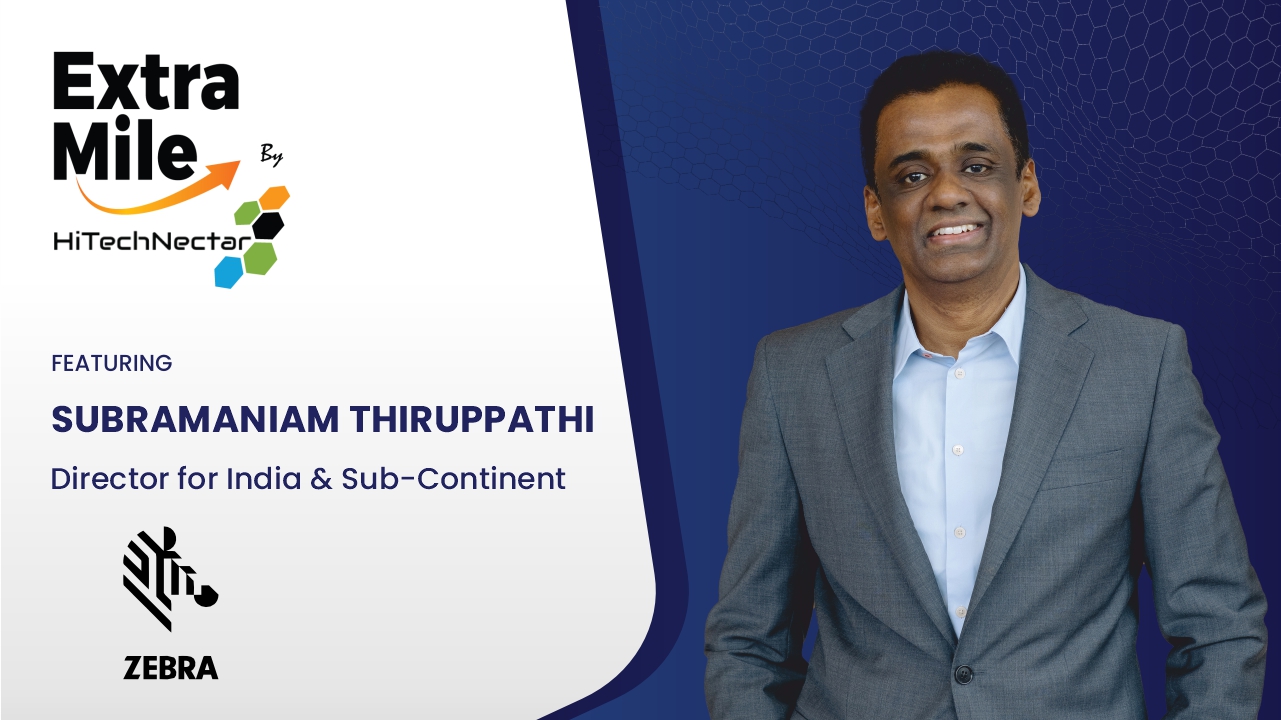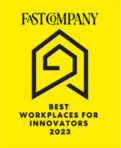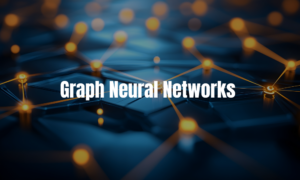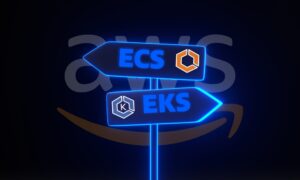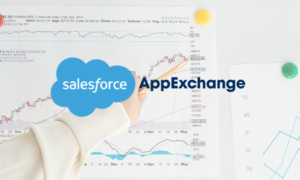Host: Hello everyone, welcome back to another episode of ExtraMile by HiTechNectar, an interview series that bridges the gap between industry leaders and enthusiasts. I am your host Sayali and we are here to discuss latest innovations, tech trends, marketing practices, expert insights, and a lot more. Today we are excited to welcome Subramaniam Thiruppathi, India and subcontinent head at Zebra Technologies.
We will be diving into how AI and Gen AI are reshaping the retail industry, the challenges retailers face, and the exciting opportunities ahead. Join us as we explore how Zebra Technologies is helping Indian retailers enhance their operations and deliver better customer experiences in this fast-evolving market. Welcome Subbu, we are delighted to have you with us today.
Subramaniam: Hello Sayali, wonderful to have met you and looking forward to have a knowledgeable conversation with you.
Host: So, let’s just directly dive into it. So, Zebra Technologies is all about empowering businesses with real-time solutions. So how do you see Indian retailers actively adopting AI and Gen AI right now?
Subramaniam: Zebra Technologies has been fortunate to be in India market since 25 plus years. I would say since early 90s, Zebra has been fortunate to be working with retailers to start barcoding sugar packets and then move on to a digital journey from when our government digitized introducing Aadhaar card, PAN cards, and all other digital payment methods. Zebra has been in the thick and thin of all this journey of the country and so with all the retailers right.
So, we have worked with retailers who had one to five stores and today many of them command or run hundreds of stores. Zebra has also had the opportunity to work with some of these retailers along with our engineers who are based in our R&D center. Zebra has a very large R&D center in Bangalore having more than 1400 engineers.
Many of the retailers, top retailers in India, visit us on a monthly or a quarterly basis where we have ideation sessions on what new technology can bring betterment for their business and also for shoppers. Now the latest wave is AI and I have been fortunate to have worked with retailers from barcoding to RFID to AI, Gen AI today. Indian retailers are going to increasingly adopt Gen AI.
I know that for sure we have been working in the last 12 to 18 months at least with the top 10 retailers who have shown interest in implementing AI for various use cases that could help them right from the warehouse to mid-mile, last mile, to the stores, to the hands of the customers. However, when we look at the mid-tier retailers, the adoption of AI is slow because of various factors that probably we can discuss.
Host: Absolutely. So, AI is becoming a game changer in the retail industry. So what are the biggest roadblocks in adopting these technologies?
Subramaniam: I would say a couple of things, right? I mean data, having the right data is the biggest roadblock for actually adopting AI. And before even going to data, when you see how retailers have today grown, they must have merged or acquired with different other retail chains.
The core systems are different, which means having the right data is a bit difficult and that is the stage we are in looking at how we can actually have the right data for the right forecast, right? This challenging, this is the biggest challenge that large retailers have and smaller retailers or mid-tier retailers, they are looking at how to bring in the right IT system, a single IT system so that they can plan and implement AI. So, India is in that journey, I would say next 12 to 36 months is very crucial for bringing in AI across the retail journey, right?
Right from vendor management to the hands of the customer.
Host: So, as we all know, Zebra Technologies has a strong presence in the APAC region. So how does AI adoption in Indian retail compare to the markets like China or Japan? And what are the lessons Indian retailers can learn from these regions?
Subramaniam: I would say APAC, as such countries like China, Japan, Australia are leading the AI adoption, whereas even India is not far behind. We had a retail survey recently and we even published it, published the India retail survey a couple of weeks back. 43% of the retailers say that they will implement AI, right?
And they would implement AI in FMCG and apparel because that is where clearly AI today stands as a game changer. But for them to adopt AI, we need optimization of system, we need optimization of supply chain and we also need a lot of analytics behind. So having the right partners, right SIs, having companies like Zebra partner will actually speed up the AI adoption.
AI cannot be ignored by retailers. Are we behind the chain with the developed countries like Japan, China, Australia? Yes, but then we are not far behind.
We are growing probably. Our adoption rate is faster than some of these developed countries and I believe that next 12 to 36 months would be very important for us and most of the retailers are actively today implementing AI across their supply chain.
Host: So Subbu, as India and subcontinent head, how have you tailored Zebra’s solutions to meet the unique needs of Indian retailers? Like can you share an example of how Zebra has helped a retailer transform its operations?
Subramaniam: Yes, sure. For me, the journey with Zebra has been from being an account manager, territory account manager, regional manager to being the subcontinent head today. I have been through the whole journey in the retail industry like from the early 2000s.
We had Future Group and other large retail chains. So, we have seen that retailers, if they have to grow from 10 to 100 to 1000 stores, they need to have technology. Without having the most robust inward-outward system, without having a robust POS system, a retailer today cannot expand in India.
India being a challenging geography, the retailers should be able to have visibility across. What Zebra has been fortunate is we have worked with these retailers right from their first store to their current thousands of stores. What have we implemented?
We implemented from barcoding. We went from simple 1D barcode, which you see these lines, and that’s why we are called Zebra, the stripes, to having 2D barcode that you use today in the UPI payments, the 2D barcode, QR barcode. And some of the retailers have already adopted RFID.
So, two examples I would give you today is RFID as a country, India is leading RFID adoption, mainly because of eTolls, right? We all have fast tags in our cars and vehicles. Because of government’s technology adoption, RFID intake into retail has become even faster as compared to other developed countries across the world.
I would say at least in Zebra, India is one of the fastest adopters of retail RFID, and we have large retailers who are using RFID in their apparels. And there are retailers who are using box-level RFID, carton-level RFID in their FMCG supply chain. What does RFID do with a retailer is, one is RFID continues to give data of what is there on the shop floor.
It also gives, hey, did Subbu or Sayali pick this shirt and go to the trial room? Did the shirt move from the shop floor to the trial room to the post counter? Or did it just stop at the post counter?
Or did it just, or the dress never moved from shop floor to the trial room? If this kind of data is available real time, today the fulfillment of a store is just not with customers just walking into the store. The store has to fulfill for customers walking into the store.
They have to fulfill for online shoppers. They have to fulfill for all shoppers in other different portals like Amazon, Flipkart, Jio, et cetera. So, the stores will get fulfillment requests from multiple channels and availability of the particular material or goods or the SKU is a must.
So, visibility is first a must. What happens if Sayali has actually ordered a white shirt small in a particular retail chain and then Subbu at that same time is having that shirt, small shirt, in the shopping basket? You will have either Subbu or Sayali as an unsatisfied customer because customer would have told that, okay, I can deliver this in 6 to 24 hours, but then the product being available at the store would have been the key decision maker.
So, visibility is what most of the apparel manufacturers are doing with RFID and Zebra has been in the forefront of this. Another example that we would wish to give is John Keels. So, if you have visited or any of you have visited Sri Lanka, Keels is a very big family and they run very large retail stores there.
So, if you walk into any of the Keels stores, then we have given shoppers a PS20. It’s called a personal shopper. It helps customers.
It helps the customer. It’s like a shopping assistant, right? So, as soon as you go in, you take out a PS20 with your OTP from the phone and it becomes your personal shopper.
So, I can ask if I want a sugar packet, I can ask where is it? If I go to a sugar packet, I can actually scan the packet and ask, hey, is this organic sugar? Is this without sulfur?
What are the other options or options for this one? What are the other options for sweeteners, etc., right? So, PS20 for many decades has been a big intake of this technology in Europe, but then in Asia, especially in Sri Lanka and countries like India, retailers have started using it.
And we believe that as the AI requirements and so customer and also customers having more knowledge than the store supervisor or store agent, retailers will be forced to implement technology to be at the top of the game.
Host: So, just to add on to RFID thing, so I myself have experience in retail for almost two to three years when I was studying back in Canada. So, what we used to do, so I was working at a ***** store and it was almost like a three-storied building. So, we used to use RFID for like if someone’s asking, for example, a white shirt in size small and if it’s not on the floor.
So, we used to use RFID to check if it’s there back in the inventory. And also on inventory days when you have to count everything, we used to use RFID for that. So, I am very much familiar with the concept that you shared right now.
Subramaniam: Oh, that’s so nice ***** is a very large global customer for us.
Host: Exactly, right. So, moving on, AI adoption often raises concerns about return on investment. So, from your perspective, what kind of ROI can Indian retailers expect when implementing AI and Gen AI?
Subramaniam: So, AI actually, it enhances customer experience. So, you know, profitability, first of all, it starts with customers, you know, having loyal customers. So, having AI will enhance customer experience.
So, there are different ways of bringing in customer experience, having self-checkout, having visibility or having running customized promo, all these needs small applications, AI, Gen AI applications, right. Then streamlined operations, it actually, once you have streamlined operations, you actually enhance the effectiveness of store associates and you are giving more time to them, personal time to them, and they are able to be more effective in front of the customer. So, with AI, for example, Zebra has come up with a few AI.
So, Zebra has been in the forefront of AI since many years, right. We have been actually, you know, we have been actually collecting data or I would say we have been naming things, like since you said you work for ***** Canada, we have named that shirt, that white shirt as XYZ, right. And you are able to know in these three floors where is that shirt there.
And Zebra has been collecting this kind of data either through barcode or RFID for decades now. Now, what are we doing new is we launched our frontline worker AI agents and we call it as Zebra companion. Now, most of the Zebra offerings today come with these companions.
And what are these companions? It’s called a knowledge agent, sales agent, device agent, and merchandising agent. For example, on a knowledge agent, what we can do is we make the newest employee the smartest employee.
For example, the ***** Canada store, if you are there, and if you are a new employee there, we actually, this companion knowledge agent would give you in-moment learning, accessing to job aids, add to knowledge base, faster onboarding, and have a higher productivity, and also show you what are the processes that can improve. For example, if you are Sayali is opening the store and you can just ask a question like, how do I make this store customer ready? And it will show, okay, this is the planogram for the store.
Just ensure all these are there. And then you click a photograph to just to see whether it’s actually compiling, right. What are the other agents?
We are sales agent. For example, if Subbu is like, you know, tech savvy, and I just walk into an electronic store and say, hey, I need a 16-inch LG. And then the store associate has a better product or better SKU, he would want to show you that. Actually, I want to ensure that there is instant product knowledge for the sales agent.
It’s really nearly impossible for a sales agent in an electronic store to know all the thousands of products with all the spec sheets. Whereas a customer, they would come with pre-prepared for buying a particular item. So, he might have more knowledge.
So, a sales agent will give instant knowledge, it will run videos, it will run spec sheets, etc., as required by the retailer, right. And also, price checks. Customer generally, he will just take out different portals and check what’s the best price, right.
So, the sales agent will be having the best of all these tools to ensure he can cross sell and upsell, and also have a customer satisfaction there. Similarly, we are having something called merchandising agent. For example, I’m standing in a retail store in front of a shelf.
There are three things that today with the development and AI that can do. One is I can have a camera that can continuously look at the shelf and automate for refilling from the backroom or order on the ERP that this shelf or this store needs to be filled with, say, milk packets, right. And also, what does it do?
Because it is doing augmented reality, it will continuously access the shelf health, right. Health of the shelf are the number of products that are required at between 3 o’clock to 7 o’clock because that is when office goers go to buy. I might fully stock.
It will continue to look at. Otherwise, what happens? I am at the mercy of the supervisor who would be busy with, you know, n number of jobs in a day in the store, right.
Then a merchandising agent can also do product placement, price and promo compliance. For example, onion, if I put it as, say, 100 rupees for a 2 kg pack and my camera can detect that, oh, the shelf label price is not correct, it will trigger a task to the supervisor and say, hey, the price in your ERP is 80 rupees. Here it shows 100 rupees.
That is probably a previous day’s price. So, these are all, you know, compliances that can happen. So, I would say if a retailer is running 100 plus stores, having the right AI, having man-machine marriage within the store will help a customer, will help a customer to be more satisfied and also he will have repeat customers there.
Host: So, we all know Zebra Technologies has a legacy of innovation from barcode scanners to AI-driven solutions. What’s next for Zebra in India? Like, are there any exciting projects or upcoming technologies you would like to share about?
Subramaniam: Zebra has been in the forefront of bringing in cutting-edge technology to India since 25 plus years. We have an engineering center, as I already mentioned, in Bangalore that’s like a 1400 people seater in Bangalore in Whitefield. Similarly, we have a software center in Pune, which is called Reflexis and also an AI company called Antuit.
These are some considerable investments into the country by our leadership team. Zebra is committed to India and I could see that we are the fastest growing country today in APAC and globally. And the country is growing, right?
I would say it is India’s decade for the next 10 years. So, our leadership is doing anything and everything that’s required to grow India. So, that brings into, you know, what is the latest AI?
So, we introduced barcode, we introduced RFID. Now, we are introducing vision system, we are introducing AI-powered tools that can help retailers actually be more effective in front of the customers and also be efficient across their business. We are also working with retailers to see how they can work on a global stage.
So, we are bringing in best practices across the globe, we are bringing in customized solutions that can improve. For example, we are ready with the multi-modal languages that can, that a retailer today can implement across all their geographies of the country, right? We are not just bringing products, we are bringing solutions and we are believing that India is a growth country for Zebra for the next decade.
Host: Absolutely. So, Subbu, you have been with Zebra for years and have played a key role in its growth, especially in India. So, what has been the most rewarding part of your journey and what’s one lesson you’d share with aspiring tech leaders?
Subramaniam: I joined Zebra thinking that it will be a two to five-year job and every five years I get excited. I would say I’m like a kid in a candy store right now. I’m embracing technologies like AI and vision, which is like machine learning, etc.
And there’s not even a moment, but not even a day without excitement, right? We have retailers, we have transport and logistics guys, we have various operators who want to know what is the next best thing to implement, right? When I started my career, say about 20, 21 years ago, it was barcoding.
Then 10 years ago, it was RFID. Then it all came into the payment solution. Today, I think India is in the cutting edge of payment.
Thanks to our government for adopting such digitized payments. And the last two years, we have been just running behind all these large best technologies. So, it’s always exciting to be working with a company like Zebra, which is forward thinking and innovating, right?
To your second question, aspiring leaders, I would say importance is adaptability, do not stop from learning, right? And also continuously innovate. Plus, I would say for leaders, embrace change and be with the youngsters.
I mean, today’s Gen Z is the wealth for India, right? Why is India at the forefront of the global growth is simply because of our talent available. And as leaders, we should be knowing how to tap these talents actually.
So, one is technology can drive growth in the industry, but people is also a real strength for India. So, leaders should know how to work and drive people to bring in efficiency.
Host: Looking ahead, what do you see as the future of retail in India over the next five years? Like how will AI and Zebra technologies transform the shopping experience for customers?
Subramaniam: I’ve always thought that we are just scratching the surface in terms of retail. India is like a 1.2, 1.3 trillion dollar of our GDP is retail and about 17 to say 21%, 22% of that is structured retail, which we can call it as modern store, or like the likes of the top 10 retailers. Out of that is our e-commerce and then the quick commerce, right?
I’ve been, just to answer your previous question, what is exciting about Zebra, right? I have been so excited about quick commerce. We are at the forefront of technology, right?
I don’t even want to know that seven minute or 10 minute, which I don’t know it’s inhuman to actually have that kind of fulfillment. Keeping that away, today we are able to deliver, say in 30 minutes something, which means visibility is there, right? So similarly, I’m excited that retailers will continue to innovate and in say three to five years, cross platforms will merge together.
So, it’ll be like, you know, buying in a store, buying online, everything will be having the same experience and retailers would have implemented technology that will bring cross-platform shopping experience, like similar, right? If I walk into a Heiko in say, for example, in Powai, and if I use that app, my experience would be similar, right? And that’s what our retailers are going to implement.
Why am I so excited more than other countries like the US or Japan or Australia is? Our mid-market retail is so big because of our sheer size of our population. The mid-market retailers, for example, regional players, once they adopt technology, we will be at cutting edge technology in retail and also customer experience.
Imagine if my village, if I’m sitting in my village in say in Tamil Nadu, I’m from Tamil Nadu, right? If I sit in my village and if I’m able to have same shopping experience that I do have it in Mumbai, I mean, that is what is actually going to happen and retailers are continuing to implement technology. So out of this $1.2 trillion, we are just bringing in technology for 22%. So the balance 78 to 80% that is the opportunity for technology companies like Zebra to automate. And this kind of market is, I don’t think anywhere it’s available in the world because the world is already probably implemented things where today it’s an opportunity for us to implement in India.
Host: Thank you so much. So lastly, if you had to select a retail brand or if you have any favorite retail brand from a tech perspective, which one would it be and why?
Subramaniam: See, having been with all the retailers, right, I wouldn’t want to name a retailer, but I would say any retailer who is investing in the backend, technology in the backend, right? Technology for the sake of just putting it in front of the customer will not go well. Even for example, if a retailer adopts AI just for showcasing it to a customer will not be long-lived actually.
Any retailer who is investing technology at the backend to see have visibility in the first mile, mid-mile and last mile, all those retailers I really like. And yeah, I don’t wish to name them, but then I would say in India, many of them have started implementing. They understand that the bottom of the pyramid, because if you take the pyramid, at the top is the customer, is the dot.
To make him happy, there are so many layers, right? And any retailer starting from the bottom, I would say they are the most, they’re the best retailer.
Host: Thank you so much Subramaniam for sharing your valuable insights on AI in retail and Zebra Technologies. It’s been a great conversation. Thank you so much.
Subramaniam: Thank you Sayali for this opportunity and looking forward to being in touch with you. Thank you.
Host: Absolutely. Thank you so much. Thank you everyone for joining us.
I am your host, Sayali, signing off for today. See you soon in the next episode of ExtraMile by HiTechNectar with our next extraordinary leader on board sharing their thoughts and knowledge.
So, please stay tuned.
Explore Our Other Insightful Interviews:


